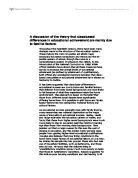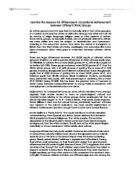It is also often believed that difference in class culture can contribute to educational success or failure. Douglas believed parental interest was the most important factor in educational success, his research suggesting middle class parents showed more interest than working class parents. However, his research has been criticised, as he measured parental interest by attendance at open days, and job difference between middle class and working class parents may account for this. These and other finding came to be known as cultural deprivation theory, believing that those at the bottom for the class structure are deprived of certain values and skills that are vital for educational success, and that working class children suffer from a lack of ambition, and fatalism. This theory has come under great criticism however, from those who support materialistic reasons for leaving school early, and those who believe that differences between class cultures are minor and insignificant.
Rather than looking at factors within the family, there are those who believe that it is the class structure that generates educational inequality, and that equality is impossible in a class-based society. Pierre Bourdieu, a structural Marxist, argues that the role of the education system is to reinforce class differences. This is achieved by promoting the ‘dominant culture’ of the ruling classes in the classroom though use of language, ensuring that working class students will be less likely to understand and be understood. This disadvantages working class students, and by creating educational success and failure, legitimises the position of both those at the bottom and top. Basil Bernstein pointed the different speech codes used by the middle and working classes, the ‘restricted code’, which is context bound and requires previous common knowledge between users, and the ‘elaborated code’ which is not context-bound, and does not require previous common knowledge. He believed that middle class children are fluent in both codes, but that working class children are confined to the restricted code, and are therefore placed at a distinct disadvantage, because teachers use the elaborated code. Middle class children are therefore more likely to understand the teacher, and be understood themselves.
Finally, rather than focusing on the societal structure or relationships outside of the school, others, particularly those of a interpretive viewpoint, focus on factors inside the school, believing that this is what determines educational success or failure. This type of approach centres around the concepts of labelling theory and self-fulfilling prophesy, believing that if someone is labelled in a particular way, other will respond to their behaviour in terms of that label, and the person will act in terms of that label, resulting in a self-fulfilling prophesy. This has been illustrated in studies by Rosenthal & Jacobson, where it has been shown that a teacher perception of a pupil’s abilities strongly affects how that pupil progresses.
Rist, in a study of an elementary school for black children in St. Louis, showed that teachers are more likely to perceive middle class children as being of higher ability than working class children, and treats them as such. He was also able to show, in concordance with Rosenthal & Jacobson’s study, that the children classified as being of higher ability performed better throughout their time in education. This illustrates that because of labelling by teachers, working class children may be placed at a distinct disadvantage.
In separate studies, Lacey and Hargreves examined the effects of streaming in schools, and found that children from working class backgrounds were more likely to be placed in lower ability streams. They also found that in these classes, the children were denied high-quality teaching and knowledge, and that the teachers spent more time controlling behaviour than teaching the class. This works to artificially disadvantage those in the lower ability streams, disadvantaging those from working class backgrounds.
It is worth pointing out, however, that none of these studies examined why teachers labelled working class students in this manner. It may be argued that this labelling is a result of family-influenced factors, such as dress, appearance and manner.
Similarly, Bernstein’s theory of language codes, although regarded as a structuralist explanation of education failure, owes much to primary socialization within the family. It may therefore be argued that family factors are the root cause of other explanation of failure.
Finally, it has been suggested that class-based differenced in education attainment are purely to do with the genetic distribution of IQ and therefore family factors (and any other social factors) are irrelevant.
In conclusion, there are many different explanations of class-based differences in educational success. However, they are not necessarily isolated, and the factors identified on one theory may be a cause of the factors outlined in another. The reasons for class-based differences may therefore be very complex, and not able to be explained by a single factor in isolation.







